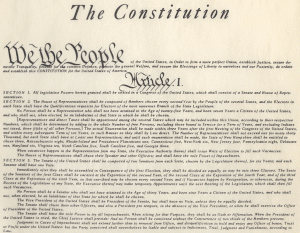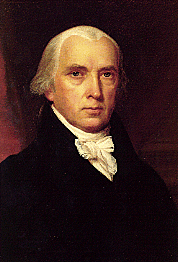 Tomorrow, Americans will vote for every seat in the House of Representatives and about 1/3 of Senate seats. The new Congress will convene in late January. As it does, it needs a few reminders. These come from the U.S. Constitution. In particular, each new member of Congress ought to reflect on Article One, Section 8, which deals with the taxing power and the authority for legislation.
Tomorrow, Americans will vote for every seat in the House of Representatives and about 1/3 of Senate seats. The new Congress will convene in late January. As it does, it needs a few reminders. These come from the U.S. Constitution. In particular, each new member of Congress ought to reflect on Article One, Section 8, which deals with the taxing power and the authority for legislation.
It says,
The Congress shall have Power To lay and collect Taxes, Duties, Imposts and Excises, to pay the Debts and provide for the common Defence and general Welfare of the United States; but all Duties, Imposts and Excises shall be uniform throughout the United States; …
First, this section lays out the three general purposes for which Congress can tax the people. The first is to pay the debts of the nation [we certainly have those, but they aren’t being paid, are they?]; the second is to provide for our national defense [so money spent on the armed forces is definitely constitutional]; the third is to provide for the general welfare. That third purpose has been taken completely out of context.
 How do I know? Go to James Madison, the Father of the Constitution, who wrote in The Federalist Papers, number 41, that some people were opposing the proposed Constitution on the grounds that the provision quoted above “amounts to an unlimited commission to exercise every power which may be alleged to be necessary for the common defense or general welfare.”
How do I know? Go to James Madison, the Father of the Constitution, who wrote in The Federalist Papers, number 41, that some people were opposing the proposed Constitution on the grounds that the provision quoted above “amounts to an unlimited commission to exercise every power which may be alleged to be necessary for the common defense or general welfare.”
That so-called objection was ridiculous, Madison maintained, because just after that provision there existed a list of specific powers granted to the Congress to carry out those three purposes. Today we refer to those as the enumerated powers. Here’s Madison’s description of how they limit the three general purposes:
But what color can the objection have, when a specification of the objects alluded to by these general terms immediately follows, and is not even separated by a longer pause than a semicolon? If the different parts of the same instrument ought to be so expounded, as to give meaning to every part which will bear it, shall one part of the same sentence be excluded altogether from a share in the meaning; and shall the more doubtful and indefinite terms be retained in their full extent, and the clear and precise expressions be denied any signification whatsoever? For what purpose could the enumeration of particular powers be inserted, if these and all others were meant to be included in the preceding general power? Nothing is more natural nor common than first to use a general phrase, and then to explain and qualify it by a recital of particulars. But the idea of an enumeration of particulars which neither explain nor qualify the general meaning, and can have no other effect than to confound and mislead, is an absurdity, which, as we are reduced to the dilemma of charging either on the authors of the objection or on the authors of the Constitution, we must take the liberty of supposing, had not its origin with the latter.
Why do I take time to mention this the day before the elections? Members of Congress, be they old or new, need to be reminded that they are not gods. They are not omnipotent; neither are they omniscient [though some would have you believe they possess both qualities]. The Constitution binds them to carry out limited powers.
It’s time we held them to the fundamental law of this republic. Wherever you are, remind your congressman. If enough of us take this seriously, they might have second thoughts with respect to their grandiose plans to remake America in their image.
